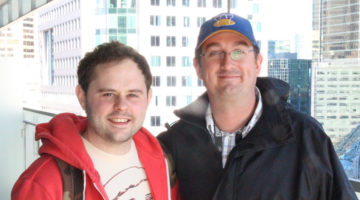Interview: Chris MacBride and Aaron Poole talk The Conspiracy
There is a world that lies beneath the one we know, or at least the one we think we know, and to delve into it is to risk becoming obsessive, paranoid, and scared straight.
It’s what happens to one-half of a filmmaking duo in the Canadian horror-thriller The Conspiracy, released on July 19. In the debut film by Chris MacBride, two young documentarians interview a conspiracy theorist, and when this raving man suddenly disappears, they start to look into what he was investigating. While Jim remains a skeptic, Aaron falls into the madness and begins to believe.
“I was never really a conspiracy theory person, but I had a friend who was into it and trying for years to get me to watch movies and go to websites,” explained MacBride ahead of the film’s release. “Then I just started watching them, I got completely sucked in, and for three or four months I was up til 5am watching things on the internet – I totally went down the rabbit hole.”
“It eventually dawned on me that it’s such an interesting, frightening, creeping world, that it would make a great film.”
So, the two sides of MacBride, the one that is hesitant about what he reads and the one that is fascinated and curious, become personified in the two main characters. The film is shot in a documentary style, as the investigation leads to the discovery of a secret society, a corporation of sorts, which lives on the periphery of societal awareness.
Canadian actor Aaron Poole, who is credited as playing himself, but in fact is playing a version of himself, said he was drawn into the way in which these subversive voices are gaining more platforms for their ideas. “A lot of sane and intelligent people are asking questions on the fringes of the society, and they have not had the audience they have today.”
“Doing a lot of research exposed me to a lot of paranoia and fear,” continued Poole. “Personally what I took away from the experience is just how healthy it is to remain doubtful and skeptical about the intention and context of information.”
Just as the creators involved in the project got their curiosity piqued, so does the audience, as McBride intended for the film to challenge the viewer to question what they are seeing, especially as the characters interview anonymous members of a secret society, and eventually make their way to infiltrate a meeting.
The third act finds Aaron and Jim donning hidden cameras and working their way into this strange group. It is not exactly a found footage film, but the point-of-view style was necessary, said MacBride.
“I think it really works, I wouldn’t change it at all, I wouldn’t have it any other way,” he said. “It’s a really different kind of found footage, there’s a different kind of tension, there’s a voyeuristic aspect to it.”
“It’s unlike anything I’ve ever done,” added Poole, who finds himself especially in the thick of things. To their credit, the two men have received much praise from the online and underground societies that the film speaks to. Then of course there are those who might just read too much into the film.
“I think maybe you can take away from the film is always question your sources of information,” said MacBride.” Just because something is on CNN, doesn’t mean it’s true. There is a lot of propaganda out there.”
“You can’t even trust the film that you’re watching.”



